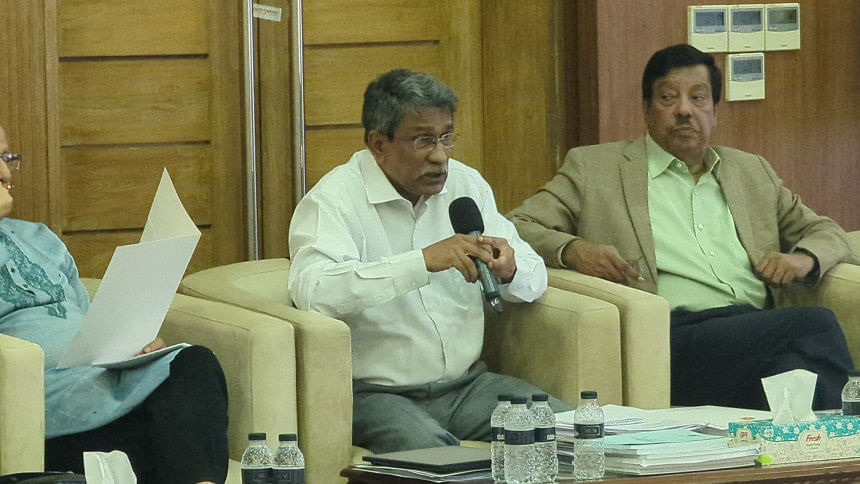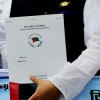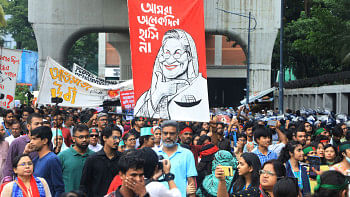Consensus talks: Deal reached on women’s JS seats

- Parties agree that 5% of total nominees in the next election will be women
- They also agree to retain existing system of having 50 seats reserved for women
The deadline set by the National Consensus Commission for finalising the July Charter expires today, yet several crucial issues remain unresolved.
Outstanding matters include the formation of the caretaker government, the selection of its chief adviser, the structure and process of establishing the upper house, the fundamental principles of state policy, and the method for electing the president.
On the penultimate day of talks, the 22nd day of the second phase held yesterday at the Foreign Service Academy, political parties reached consensus on women's representation in parliament. Seven key topics were on the agenda.
Prof Ali Riaz, vice-president of the National Consensus Commission, told reporters after the talks around 9:30pm that parties agreed to nominate women in at least 5 percent of constituencies in the next national election.
They also consented to retaining the existing 50 reserved seats for women, with necessary constitutional amendments to follow.
"Almost all parties agreed in principle to gradually raise the number of women's seats to 100," Riaz said, adding that while some parties submitted notes of dissent, "a broad consensus has been established".
He said following the charter's signing, political parties would be urged to nominate at least 5 percent female candidates in the next polls. The constitution will also require 10 percent female nominations in the following election, with the quota increasing by 5 percentage points in each subsequent one until 33 percent representation is achieved. The reserved seat provision would remain until 2043 or be repealed earlier if the 33 percent target is met.
Riaz added that a concept paper on expanding the president's powers had been shared with parties.
The proposed expansion includes appointments to the posts of attorney general; heads and members of commissions such as the NHRC, Information Commission, Press Council, Bangladesh Bank, UGC, and the energy and telecom regulators; chiefs of the armed forces; and heads of DGFI and NSI.
"These proposals have been sent to the parties for consideration," said Riaz. "If consensus is reached, constitutional amendments will follow."
Members of the commission also met Chief Adviser Prof Muhammad Yunus, who chairs the commission, to brief him on progress and disagreements.
"Our goal today is to reach full consensus on the July Charter," said Riaz. "We've already agreed on 14 major issues, including women's representation. Parties were asked to submit written amendments."
He said the commission has been tasked with resolving decisions on the caretaker government system and the upper house structure. The commission will clarify its position on the matter today, he said.
A preliminary draft of the charter has already been shared with
parties. "We expect to receive any final additions or revisions by tomorrow (today)," said Riaz.
Apart from women's representation, the agenda covered proposals on the president's role, presidential election procedures, upper house structure and membership, expansion of fundamental rights, and principles of state policy.
Riaz said discussions on presidential powers would be deferred, as the proposal was newly introduced.
"We want to reach unanimous decisions on all other matters and your cooperation is essential in doing so, just as you have supported us since the beginning. We will continue our efforts in that spirit," he added.
The commission's proposal submitted earlier during yesterday's talks called for nominating women in 5 to 7 percent of general seats in the upcoming polls while retaining the 50 reserved seats.
In the following election, the quota would rise to 15 percent, increasing incrementally until 100 women are directly elected to parliament by the 15th parliamentary election.
BNP Standing Committee member Salahuddin Ahmed proposed starting with 5 percent, stating that his party would struggle to field so many female candidates. He suggested raising the number to 15 percent starting from the 14th parliament.
NCP Member Secretary Akhter Hossen opposed the commission's proposal and reiterated support for direct elections to 100 women's seats.
Jamaat-e-Islami Nayeb-e-Ameer Syed Abdullah Mohammed Taher opposed BNP's stance and suggested exploring other ways to increase reserved seats "in a way that honours the spirit of inclusion."
In response, Riaz said the final decision would follow Prof Yunus's guidance.
Tania Rab of JSD (Rab) and Mominul Amin of NDM recommended easing the binding quota to allow parties flexibility in fielding 5–7 percent female candidates.
CPB General Secretary Ruhin Hossain Prince advocated for direct elections to the 100 women's seats, while IAB's Ashraf Ali Akon supported a proportional representation system.
DRAFT CHARTER
BNP's Salahuddin told reporters that the charter would ultimately be implemented through the next parliament.
"The charter is a social contract among the nation, its people, political parties, and stakeholders. I believe the only legitimate space for its implementation is the national parliament," he said.
"Once the charter is finalised and made available, will any political party dare to reject it? And if they do, where will their political credibility stand?"
During a tea break, Jamaat leader Taher remarked, "A legal framework must be built for the charter. Otherwise, these discussions will bear no fruit."
Jamaat representative Advocate Shishir Monir proposed several legal options, including a Legal Framework Order (LFO), a pre-election referendum, or an ordinance issued by the chief adviser. He cited examples from the Zia and Ershad regimes where referendums and proclamations were later ratified by parliament and given constitutional status.
NCP's Akhter strongly objected to the current draft's two-year implementation timeline.
"We categorically reject such a delay. A charter that takes years to implement only opens the door to deception and betrayal of the people's expectations," he said. "We do not want another ineffective, incomplete, and toothless document like past 'three-party frameworks.'"
The NCP has demanded that the charter incorporate reforms agreed upon by all parties, carry legal enforceability, and provide a mechanism for immediate implementation.
"We are not willing to sign any document that does not meet these criteria," Akhter warned.

 For all latest news, follow The Daily Star's Google News channel.
For all latest news, follow The Daily Star's Google News channel. 





Comments